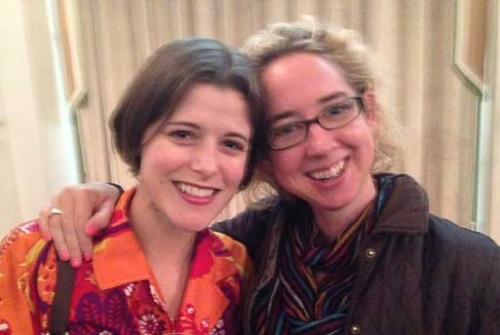
Summer Research Snapshots 2014
For summer 2014, The Graduate School awarded 425 summer research fellowships to Duke Ph.D. students, including 246 guaranteed fellowships for first- and second-year students and 179 competitive fellowships for students in their third year or beyond. Here is a look at some of the student work supported by those fellowships, in the words of students themselves.
Note: Did you receive a 2014 summer research fellowship from The Graduate School but are not on this list? Share your summer exploits with us.
Art, Art History and Visual Studies

Emilie Anne-Yvonne Luse
A summer research fellowship from The Graduate School allowed me to complete some of the academic projects that have kept me busy throughout the school year. In conjunction with my summer teaching commitment, I was able to finish an article I am preparing for publication and to carry out the research needed to complete my dissertation prospectus on reactionary art criticism in the 1930s in France. Finally, the fellowship, combined with departmental help, allowed me to travel to Helsinki, Finland, in August, where I chaired a panel on French art from the 1930s at the European Network for Avant-Garde and Modernist Studies Conference (PDF) at the University of Helsinki.
Pictured: Luse (left) with a panel participant at a conference reception hosted by the mayor of Helsinki in the city's neoclassical town hall.
Camila Maroja
At the beginning of the summer, a summer research fellowship from The Graduate School allowed me to conduct research at the archives of the Museum of Modern Art in New York. I examined primary sources for an important 1993 multi-venue exhibition that will feature in my dissertation, titled "Latin American Artists of the Twentieth Century." While in New York, I also visited Brazilian artist Lygia Clark’s monographic show at the same institution and interviewed artists and curators.
In the latter part of the summer, I participated in a workshop organized by the Kandinsky Library at the Centre Pompidou in Paris to examine the participation of Latin American artists in the celebrated 1989 show “Magiciens de la Terre.” The workshop was held on the 25th anniversary of the show, and the show’s chief-curator, Jean-Hubert Martin, was present. I am very grateful to The Graduate School that enabled me to have this summer experience.
Maroja's summer research fellowship was supported by the Judy C. Woodruff Fellowship Endowment Fund.
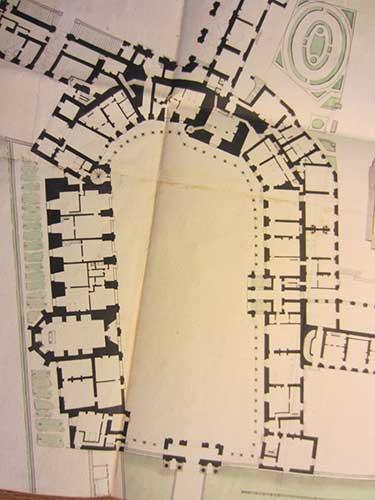
Elisabeth Narkin
The Duke Graduate School summer research fellowship allowed me to begin research for my dissertation project, “Rearing the Royals: Architecture & the Spatialization of Royal Childhood in France, 1499-1610.”
My dissertation analyzes the manner in which the social life of the French court and royal family unfolded in the architectural spaces of châteaux located in and around Paris from 1499 to 1610. It examines the lives of the dauphin and his entourage of tutors, governesses, siblings, and playmates to understand how architecture actively shaped and was transformed by the needs of the royal family.
Through the generosity of the fellowship program, I was able to spend time in Paris, where I consulted primary sources such as correspondence, account books, prints, and plans at the Bibliothèque Nationale de France and the Archives Nationales and visited some of the buildings at the heart of my project, including Saint-Germain-en-Laye and Fontainebleau.
Pictured: An archival document showing the layout of the royal castle of Fontainebleau and its gardens.
Narkin's summer research fellowship was supported by the Allen and Joyce Temple Graduate Fellowship Endowment Fund.
Biology
Ko-Hsuan Chen
From May to June, I was mostly at Duke, preparing samples for RNA-seq run to obtain data as part of my thesis. I attended the Evolution 2014 meeting on June 20-24 in Raleigh to learn about new ideas in evolutionary biology. After visiting my family in Taiwan in July, I attended the International Mycological Congress, which is held every four years, in Bangkok, Thailand, on August 3-8. There, I presented a poster, which won the best poster award. I also prepared a manuscript for a paper submission in the Molecular Phylogenetic and Evolution journal, which I have since submitted.
Chen's summer research fellowship was supported by the Ray J. Tysor Graduate Fellowship Endowment Fund.
Patrick Green
I spent the majority of my summer analyzing and writing up data I collected in the spring semester. I’m hoping to publish this work in a premier journal soon. This work also builds a strong foundation for the rest of my dissertation. I was really excited to analyze my data, find some interesting conclusions, and get it ready to publish.

Yuanjie Jin
Thanks to the generous Ray J. Tysor Graduate Fellowship, I was able to concentrate on my PhD thesis research full-time during the past summer. I study the signaling pathway of gibberellin (GA), an essential plant hormone that regulates all kinds of developmental processes, including seed germination, stem and root elongation, leaf expansion, flowering and fruit development. Specifically, I am interested in unraveling the mechanisms of how DELLA proteins, a group of growth repressors, inhibit GA responses through interacting with a class of newly identified transcription factors IDDs.
During the summer, I conducted a series of transient expression essays using both tobacco and Arabidopsis, from which I collected interesting data suggesting that DELLAs and IDDs exert opposite transcriptional regulation on select GA target genes. I also used a genetic approach to show that certain GA-related phenotypes of IDD transgenic lines can be suppressed by a DELLA-dominant mutation.
Together, these results serve as a cornerstone supporting a model that DELLA and IDDs antagonize each other in GA signaling through direct protein-protein interaction. A better understanding of these components and their network would not only shed light on GA signaling, but provides potential in crop improvement via genetic modifications. As such, I feel really fortunate to be funded by Ray J. Tysor Graduate Fellowship, without which I wouldn’t have had such an exciting summer full of discoveries.
Jin's summer research fellowship was supported by the Ray J. Tysor Graduate Fellowship Endowment Fund.
Tzu-Tong Kao
I took the Tropical Plant Systematics course at the Organization for Tropical Studies and the University of Costa Rica. During the one-and-a-half months of the course, I visited four biological stations in Costa Rica—Las Cruces, Cuericí, Palo Verde, and La Selva—which represent, respectively, mid-elevation tropical rain forest, Páramo, tropical dry forest, and low-elevation tropical rain forest.
In the course, I did a morphological phylogenetic project on filmy ferns (Hymenophyllaceae) and another leaf structure study on Gleicheniaceae. The two manuscripts will be published in the course book, and I am trying to develop the second project further and publish it in a scientific journal. I also took part in writing the Neotropical Genera Guild for students in the course and contributed to the description of eight plant families.
On this trip, I collect 151 fern specimens (four duplicates each) for my doctoral study and deposited them in herbaria at Duke, Costal Rica, and Taiwan.
After the trip to Costa Rica, I went back to Taiwan (my home country) and visited the Taiwan Forestry Research Institute to learn some cytological technique. I also joined a tree fern conservation lecture in the Fushan biological station and added some data for my Gleicheniaceae project there.
Alejandro Pietrek
Using high-resolution images, I studied the spread of invasive beavers in the last 11 years in a 600-square-kilometer area in the Patagonian steppe. I found a great increase in the area used and occupied by beavers from 2003 to now. My goal is to build statistical models to more effectively predict the features that beaver select at the landscape scale. This will provide a tool to more efficiently control and manage the beaver invasion in the Patagonian steppe.
Cultural Anthropology
Can Evren
I spent summer 2014 researching formal and informal archives related to soccer history in Turkey. I spent time in the national republican archives, collecting information about the institutionalization of soccer, the history of physical education, and sports federations in postwar Turkey. In addition, I have interviewed three important figures in the history of soccer coaching in Turkey—people who have occupied significant positions in the technical education department of the Turkish soccer federation. I’ve recorded interviews with them concerning the past, present, and future of soccer institutions and coaching systems.
Also, I spent a lot of time using second-hand bookstores as an unconventional archive, where I have found remarkable books that were published but never been publicized. These include memoirs of sports personnel of various positions, governmental reports on institutional reform, and technical education material published for circulation.
Ecology

Marissa Lee
I have been investigating variability in the effects of stiltgrass (Microstegium vimineum) on soil carbon and nitrogen cycling across sites where the invader ranges in abundance, as well as the degree to which its nutrient-use strategy matches that of the resident nutrient economy. Thanks to the Graduate School Summer Research Fellowship, I was able to continue work on an observational network of stiltgrass-invaded plots in the Duke Forest and NC Plant Conservation Program properties.
I also spent a portion of this summer working on a theoretical model to formalize our understanding of the ways in which invasions by plant species alter nutrient cycling. Last but not least, the flexibility afforded by the fellowship allowed me to participate in a workshop called Open Science for Synthesis in Chapel Hill, North Carolina, where I learned new technical skills to conduct open and reproducible synthesis research. These skills will be useful immediately, as I develop the theoretical model described above, and throughout my career.
All of this would not have been possible without support from The Graduate School. Thank you!
Kendra Smyth
I began my summer by traveling to Woods Hole, Massachusetts, in early May to present my research at the annual meeting of the NSF Research Coordination Network for Ecoimmunology. Upon returning to Duke, I assisted our lab manager in validating fecal hormone enzyme immunoassays for meerkats and made more progress on my meerkat parasitology work.
I got a short break from lab work in the first week of June when I participated in a NESCent Ecoimmunology working group. This was the third meeting of the working group, and we made good progress reviewing the literature for our upcoming meta analysis.
I spent the rest of the month writing my first parasitology manuscript. I also wrote a book review for Science magazine, which was published a few weeks later. I was back in the lab for July, splitting my time between endocrine and immune analyses. In August, I presented new data at the Animal Behavior Society’s annual meeting in Princeton, New Jersey, and made final arrangements for my upcoming field season.
Economics
Luis Enrique Candelaria
Thanks to the generous support from The Graduate School, I was to focus all my time and energy on writing my dissertation, which I expect to complete on time. As opposed to previous summers in which I have been an instructor in the economics department or worked as a research assistant to a professor, in this summer I was able to make profound progress on my research and write drafts for several chapters of my dissertation. Furthermore, I got other opportunities to interact with professors in other universities and other centers of research. The summer research fellowship also gave me the opportunity to present my work in progress at the seminar of economic research at the Central Bank of Mexico. I received several insightful comments on my work, and it was good preparation for going into the job market.
Candelaria's summer research fellowship was supported by the Graduate School Arts & Sciences Fellowship Fund.
Jose Martinez Carrasco
During the summer I was working on my project. Students who choose applied microeconomics as their major field must finish a paper at the end of the second year of the PhD program. I delivered the first version on June 2 and received many useful comments from my reader, which I have incorporated into my second-year project. I delivered the final version on August 30.
Yifang Guo
I am very grateful for the Duke Graduate School Summer Research Fellowship, which freed me from other graduate assistant work and enabled me to focus on my own research. I have made significant progress on my research on the competitive effects of price-matching policies in the retail gasoline industry using micro-level data.
Price matching appears to enhance the competition by guaranteeing consumers the lowest price. However, it also eliminates competitors’ incentives to lower their prices because they can’t steal any consumers by pricing lower. Thus, whether there are any collusive effects in the retail gasoline market remains to be a question. It would be interesting to find out whether price-matching policies lower or increase the overall prices.
Only with the support of The Graduate School could I devote myself wholeheartedly to my research project. I really appreciate it. I want to thank you all for your kindness and generous. I hope someday in the future, when I become successful and have the ability to sponsor fellow students, I can follow your steps to pass on the spirits and support to our next generation. Again, thank you very much!
Guo's summer research fellowship was supported by the Robert K. Steel Family Graduate Fellowship Endowment.
Fu Ouyang
With the Graduate School’s summer research fellowship, I was able to concentrate on my research on distribution-free estimation of multinomial discrete choice models in summer 2014. My summer research involved developing two new and more robust estimators for polychotomous choice models which have a wide range of applications in labor economics, industrial organization, and marketing research.
These new estimation procedures aim to address two main drawbacks of existing methods—the fact that they cannot do welfare analysis and are hard to implement. To find the right direction to establish the theoretical framework for the proposed estimators, I did a great deal of literature review. After that, I also ran many simulation experiments to test whether my idea works well for different kinds of models and data. Both tasks are very time-consuming work. Thanks to this generous financial support. I was free to spend considerable time on reading and coding during the summer. My summer research turned out to be fruitful, and it gave me good foundations for writing my dissertation in the upcoming academic year.
Ouyang's summer research fellowship was supported by the Alice Blackmore Hicks Fellows Endowment Fund.
English
I. Augustus Durham
This summer, I was able to dedicate all of my attention to preparing for my fall preliminary exams. After compiling my reading list in February 2014, I utilized the summer, and the funding afforded me by the fellowship, as the prime moment to delve into that list. Likewise, I engaged in some free writing this summer, which manifested in an as-yet-unpublished essay on Marvin Gaye’s “Trouble Man” and its relation to a proverbial kind of gender trouble. I think that writing this piece actually improved the tackling of my reading list because I was compelled to encounter syntheses across disciplines and texts that may not generally be read together. The summer research fellowship I received made this possible, and for that I am immensely grateful!
Rebecca Evans
The summer research fellowship allowed me to both to focus on my dissertation and to explore new research avenues for subsequent projects. I continued to work on my dissertation, which argues that tropes of natural temporality, as well as concepts of space and place, are central to the environmental imagination. I examine the way that post-1945 American environmental justice literature and culture offer a specific model of natural time and its connection to human history, and I posit that this model offers a technique of responding to the challenges of climate change and the Anthropocene while remaining attentive to social justice.
I also researched and began writing a secondary project, a forthcoming article on 1970s science fiction and its implications for post-1970s environmental discourse. In addition, I participated in a two-week intensive program on animal studies, an annual interdisciplinary science studies seminar offered by the University of Vienna every summer on various topics. There, I continued research on a tertiary project concerning American literature’s imagination of animals and the nonhuman world as “enemies.”
Environemnt
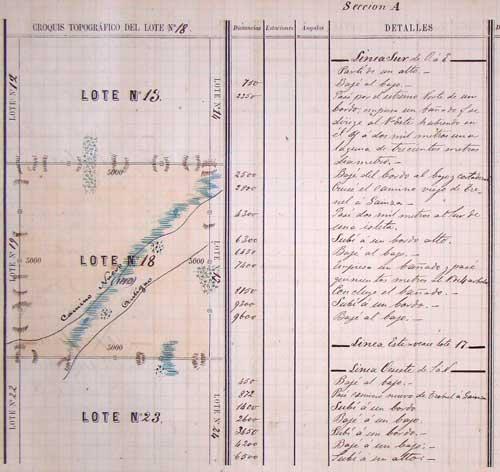
Mariano Gonzalez Roglich
During this summer I worked on my dissertation research on woody plant cover dynamics in semiarid savannas of central Argentina. Forest and savanna ecosystems are very important because they provide numerous benefits to society, including provision of food and fiber, climate control, soil protection, and the preservation of local biodiversity. This region is particularly interesting to the study of land cover change because it is an active agriculture frontier where both losses and gains in tree cover are occurring. Therefore understanding which factors affect reduction and increase in tree cover is critical for developing better management and conservation practices.
During the summer I spent a month in Argentina, where I visited the study area to collect field and historical information to validate the land cover change analysis I have developed for this region using historical maps from the 1880s. I constructed a land cover dataset for this region for the 1880s, which I later compared to current land cover maps to assess changes over time and to identify drivers of change. I found that environmental factors where the most important drivers of change, but human influences were also significant. Interestingly, we also found evidence for legacy effects from land uses that had happened over 120 years ago. The article has been submitted to the journal Landscape Ecology.
Pictured: Historical maps of the study area
Evolutionary Anthropology

Randi Griffin
I spent much of the summer collecting mosquitoes from forests and pastures in Durham and identifying them to the species level based on morphological characteristics. We used insect light traps baited with carbon dioxide to attract mosquitoes seeking hosts. This work was done in collaboration with an entomology lab at North Carolina State University.
Our goal is to determine whether the number and diversity of mosquito species vary across microhabitats. Over the course of the summer, I caught and identified over 2,000 individual mosquitoes spanning 17 different species. Trapping will continue into October.
German Studies

Heidi Hart
Thanks to the Duke Graduate School summer funding, I was able to complete the first chapter of my dissertation while in Berlin. My research is on 19th-century poetry set to the Marxist-activist music of Hanns Eisler. Over the summer, I attended theater and musical performances related to my work and was able to consult with scholars in musicology and intermediality. As a singer, I also rehearsed with my music partner in Berlin and performed several Eisler songs that will be important to my second chapter. I look forward to returning to Berlin this fall to visit the Eisler Archive and continue my writing. Thank you very much for the support!
Pictured: Hart's workspace in Berlin.
History
Meggan Farish
This summer I used funding from the summer research fellowship as well as two other grants to continue research for my dissertation, “Mediating Violence in the Post-Revolutionary United States: Communities, Conflict, and Local Law, 1790-1840.”
Local criminal court records provide important information regarding how slaves and free people of color navigated the legal system during this time. Initially, my project was centered in North and South Carolina, with a focus on local courts in rural areas of both states. However, I decided to use my grants to expand my research trips to include the Library of Virginia, the New York Historical Society, and the Municipal Archives of New York. Richmond and Manhattan have proven fruitful with regards to some of the central issues of my project and in taking my dissertation in new and exciting directions. As a result of branching into the upper South and the North, my dissertation will now make several new and important contributions to the field. I greatly appreciate the committee granting me this award.
Farish's summer research fellowship was supported by the Graduate School Arts & Sciences Fellowship Fund.
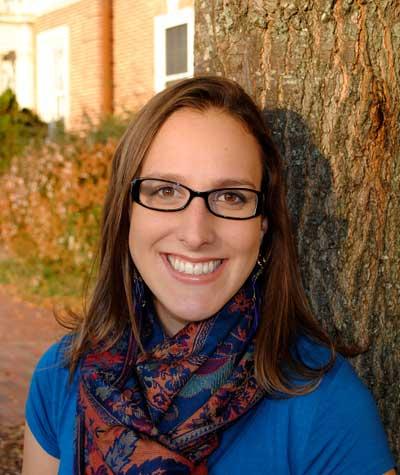
Ashley Young
This summer, I conducted research at the French National Archives and National Library located in the heart of Paris. My morning commute took me along the Seine and then through the historic Les Halles district, where the city’s central food market used to be located. In its heyday, Les Halles, as the market was known, was an exemplar public market in Europe and served as a model for cities throughout the Atlantic world. It was fitting, then, to walk through this historic district on my way to the archives because I was conducting research on the institutional history of Les Halles.
Some of my favorite archival sources included paintings of the motley crew of food vendors who meandered near the market selling piping hot baked goods, steaming stews, and other delectable comestibles to passersby. Their resounding street cries, which described their offerings, would have rung out in the bustling streets around the central market. Captivated by this culinary cacophony, artists often transcribed these cries and included them in their visual depictions of Parisian vendors. These are incredibly vivid illustrations of street food culture in 19th-century Paris that provide insights into the daily food procurement practices and culinary culture of Parisians at that time.

Ajay Thomas
My summer in India was extremely fruitful. I spent my first month doing research in Delhi, Mumbai, and Kolhapur. I also completed an intensive summer language program in Marathi and Modi script at Pune through the American Institute of Indian Studies (AIIS). The Modi script is a very old script of western India that is no longer used. However, it is essential for reading old Marathi documents and manuscripts.
Pictured: Thomas (far left, back row) with his teachers and fellow students at AIIS Pune.
Literature
Amanda Starling Gould
With the generous funding made available by The Graduate School’s summer research fellowship, I was able to dedicate the summer months to outlining and writing the first chapter sections of my dissertation research project. My project proposes a digital metabology as a framework for better understanding how digital networked technologies are implicated in human and geophysical ecologies. In addition to mapping the outlines of my digital metabolism project, the fellowship enabled me to produce a research publication and undertake a public pedagogical blogging experiment co-sponsored by the Duke Ph.D. Lab in Digital Knowledge and by the Humanities, Arts, Science, and Technology Alliance and Collaboratory. It also allowed me to pursue a critical aspect of my own learning by helping to finance a series of humanities-based coding courses that will be useful for both my research and my teaching goals.
Gould's summer research fellowship was supported by the Graduate School Arts & Sciences Fellowship Fund.

Melody Jue
Why would a scholar of literary theory be interested in the ocean? Imagine you are diving through greenish water, and you see the shadowy blur begin to appear. As you swim closer you begin to make out vaguely human shapes—a whole school of human beings, perhaps? Are they real? Swimming even closer, you begin to see that these are old faces, with bits of seaweed, orange sponges and purple tunicates growing on them. Human bodies as new sites of life.
Since you are in the Caribbean, perhaps some of these resting sculptures remind you of the Middle Passage, of the history of slavery and the bodies of Africans cast overboard. Yet you know that the artist has denied such a connection, insisting that the sculptures are about the future preservation of coral reefs. You wonder why the artist would deny this historical resonance. You wonder what makes something a museum if the emphasis is not on preservation, but on some kind of principle of change and erasure. The only way to find out is to go see for yourself.
This was the Underwater Museum I studied in Isla Mujeres, Mexico.
Marine Science and Conservation
Sara McDonald
Thank you for the summer funding! I used this funding as a dissertation-writing fellowship. Over the summer, I submitted a journal article for publication, completed the second chapter of my dissertation, and wrote a second journal article that is undergoing internal review. I also presented my findings at a lecture for the Marine Conservation Summer Institute.
Many thanks for the funds! I will be graduating in December, and it was crucial that I was able to complete the chapter and journal article over the summer!
McDonald's summer research fellowship was supported by the Pope Family Fellowship Fund.
Haydee Dominguez Tejo
The 2014 summer research fellowship from the Duke Graduate School allowed me to make great progress in my dissertation research, focusing on the conservation-status assessment of the rare and endangered Antillean manatee in Hispaniola. Because the Dominican Republic and Haiti lack monitoring programs for this species, my research combines historical ecology with social science and habitat modelling approaches to assess the species’ past and current distribution and threats.
This summer I was able to refine and continue populating a comprehensive database of manatee occurrence records around the island, extracted from different types of documentary archives. I also continued data input of over 600 questionnaires to artisanal fishermen from both countries, previously collected between June 2013 and January 2014. In addition, using different species distribution modelling techniques, I developed the first set of habitat models that highlight important areas for manatees in the Dominican Republic.
I expect to make a substantial contribution toward the development of a national conservation plan for manatees in the Dominican Republic, and bilateral conservation actions with Haiti. Thank you, Duke Graduate School, for your generous support!
Tejo's summer research fellowship was supported by the Clinical Faculty Arts & Sciences Fellowship Fund.
Mathematics
Hangjie Ji
The Graduate School Summer Research Fellowship enabled me to continue my research on the thin film equation model. It was a pretty productive summer. I was also preparing for my preliminary exam.
Music
Samantha Arten
My summer research fellowship enabled me to spend my summer in England, engaging in pre-dissertation research at the British Library. I am delighted to report that I returned with a dissertation topic in hand and many of the materials necessary to begin work on an exciting project on English Reformation metrical psalmody. The British Library owns copies of nearly all of the metrical psalters published in England prior to 1600, and the opportunity to handle these rare books proved to be an incomparable experience that will directly inform my research into the ways in which these texts and music helped shape the devotional life and religious understanding of the English laity.
I also had the opportunity to travel outside of London. I attended the annual Medieval and Renaissance Music Conference at the University of Birmingham, where I met several leading scholars in the field of early music and established contacts with people whose work will play a major role in my dissertation. I also made a somewhat unexpected trip to Cambridge to view Archbishop Matthew Parker’s own copy of the published Parker Psalter (1567)—with marginal annotations in his own hand!
Arten's summer research fellowship is supported by the A.J. Fletcher Graduate Fellowship in Music Endowment Fund.
I spent the majority of my summer research time brushing up on the basics of music history for my qualifying exam, which I’ll take in January 2015. I have a much better view of music history now. Also, I took the German for Reading Knowledge course and kept studying after the course was finished.

D. Edward Davis
In August, I traveled to Düsseldorf, Germany, where I lived and worked with composer Antoine Beuger for three-and-a-half weeks. In addition to lengthy private composition lessons with Beuger, my time was spent attending concerts and rehearsals and getting to know the musical landscape of the city.
Beuger runs Edition Wandelweiser, a record label and publishing company, as well as a concert series called KLANGRAUM. During my stay, I was honored to be able to perform with him as part of this series, in a concert that included premieres of two new works that I had written.
Finally, my travels coincided with the International Summer Course for New Music, a huge festival that takes place every two years in Darmstadt, Germany. I spent a few days at the festival Darmstadt, taking in concerts and lectures and making connections with the broader world of new music.
Pictured: Davis performing with Beuger
Davis's summer research fellowship was supported by the Graduate School Arts & Sciences Fellowship Fund.
Kirsten Santos Rutschman
I am exploring intersections of Swedish art music and folk music in the 19th century, and the summer research fellowship gave me the opportunity to spend the summer carrying out pre-dissertation research in Duke’s own Music Library. I was able to familiarize myself with valuable items in Duke’s collection, including the recently finished complete works of the composer Franz Berwald and scattered works by other Swedish composers. Thanks to a series of microfilms in the Music Library, I’ve also been able to transcribe the unpublished half of what is proving to be an important correspondence between the composer Adolf Fredrik Lindblad and his German contemporary, Felix Mendelssohn Bartholdy. In addition, this fellowship provided me with the time necessary to develop my ideas and incorporate my explorations into a dissertation prospectus, which I will defend in the fall.
Rutschman's summer research fellowship was supported by the Davidson Family Endowment Fund.
Nursing
Mariam Kayle
My area of research interest is symptom management for children with complex chronic illnesses. Specifically, I am interested in fostering self-management skills in adolescents with sickle-cell disease who are transitioning to adult care to improve their health outcomes. I conducted a focus group study over the fall semester examining the challenges that parents and adolescents with sickle-cell disease face and the strategies they use to self-manage the disease. This study will inform my dissertation.
Over the summer, because of the fellowship, I was able to focus on my research and academic pursuits and advance my work towards the dissertation. In particular, I was able to analyze focus group data, prepare a draft manuscript from this data, and submit three abstracts. One abstract was accepted for a podium presentation at the 2014 State of the Science Congress on Nursing Research, Council for Advancement of Nursing Science, in Washington, DC. Two other abstracts were accepted at the Eighth Sickle Cell in Focus , National Heart , Lung and Blood Institute, National Institutes of Health, in Bethesda, Maryland; and the 14th Chronic Illness and Disability Conference: Transition from Pediatric to Adult-based Care, in Texas, Houston. I was also able to form my dissertation committee and start a draft dissertation proposal. Over the coming few months, I will be preparing to take my preliminary exams, defend my proposal to achieve doctoral candidacy, and submit a research grant for my dissertation.
Yuting Song
This has been a very fruitful summer for me. I have been working on preparation of the pilot data that I collected during December 2013, including transcription of audio files into verbatim texts, translation from Chinese to English, and back-translation from English to Chinese.
I have also resubmitted a literature-review paper to the International Journal of Nursing Sciences, which is currently under review. In addition, I have been working with my mentors on my dissertation study proposal and have submitted the proposal to the Council for the Advancement of Nursing Science/Southern Nursing Research Society Nursing Science Advancement Dissertation Grant Award.
Philosophy
Paul Henne
While I worked on a few papers that I hope to submit to journals this year, I also continued to develop a philosophy video project that I've been building for about a year. The project is called Wireless Philosophy, and it aims to open access to philosophy to the world. Our target audience is late high-school students and college students, but anyone can learn from our videos. The format is short lectures by some of the top philosophers in the world accompanied by animated videos.
This summer we partnered with Khan Academy, developed a series of new videos, and even started making skill-assessment sections for critical thinking. We are getting thousands of viewers every month from all over the world.
Psychology and Neuroscience
Elizabeth Victor
This summer I analyzed functional magnetic resonance imaging, longitudinal self-report, and experimental behavioral decision-making data collected from over 50 undergraduates to determine the relationship between neural function and sexual risk decision making and risk behavior over time. More specifically, I examined how the interaction of threat-related amygdala reactivity and reward-related ventral striatum (VS) reactivity affect sexual risk behavior.
Previous research conducted in my laboratory has found that certain neural phenotypes (high VS reactivity coupled with low amygdala reactivity and low VS reactivity coupled with high amygdala reactivity) are associated with increased alcohol use and abuse. Therefore, I wanted to extend these findings to determine if there were similar neural-risk phenotypes associated with sexual risk behavior.
After conducting an experimental decision-making paradigm wherein undergraduates made hypothetical sexual decisions before and after exposure to sexually explicit cues (i.e., a sexual arousal manipulation) and collecting self-report data on sexual behavior across a period of six months to a year, I conducted multiple hierarchical linear and poisson regressions.
To date, I have found multiple interesting and valuable findings to inform our understanding of the intersection of neuroscience and sexual risk behavior, a largely understudied field.
Victor's summer research fellowship was supported by the Clinical Faculty Arts & Sciences Fellowship Fund.
Public Policy Studies
Amy Finnegan
Thanks to the summer research fellowship, I was able to accomplish the academic goals I set for myself. My dissertation concerns maternal mortality in economically developing countries. During summer 2014 I was able to travel to Indonesia for eight weeks to take part in a language-immersion program in Bahasa, Indonesia. By the end of the program I went from knowing zero words in Indonesian to passing my exit exam at the intermediate high level. While in Indonesia, I was able to make connections with local experts in maternal child health policy who provided the essential context I was lacking. Without the summer research fellowship, I would not have been able to participate in this program.
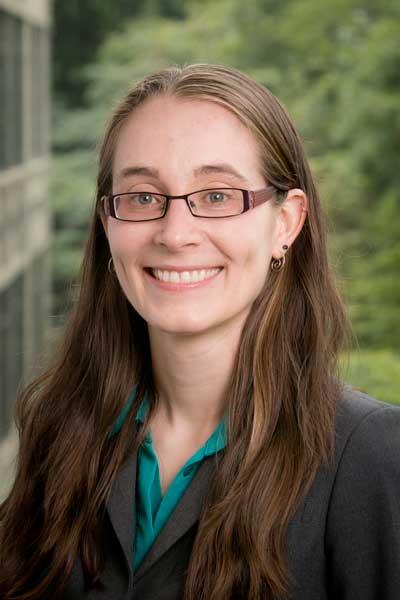
Marina Gorsuch
This summer, I implemented a field experiment that explores the role of identity in labor-market discrimination. Social psychology has found that women are rated more negatively than men when they engage in masculine behavior (such as negotiating for a salary increase). This is called the backlash effect, and I am examining whether it varies by sexual orientation. Economic and psychological theories suggest that men react negatively to women acting in traditionally masculine ways because their own masculine identity is threatened. If the backlash effect varies by sexual orientation, especially if gay women are exempt from the backlash, it suggests a large role for identity in the backlash effect.
In a laboratory setting, I have previously found that that male respondents rated résumés of perceived-heterosexual women with masculine adjectives more negatively than when the résumés had feminine adjectives. The résumés of perceived-heterosexual men and perceived-gay women were both immune to this effect. This summer, I took this question outside of the laboratory environment and implemented a résumé-audit study where I used résumés that were manipulated on sex, sexual orientation, and adjectives to apply for jobs that were publicly advertised in multiple cities and towns in the United States. It was wonderful to receive financial support over the summer from The Graduate School to implement this time-intensive experiment!
Gorsuch's summer research fellowship was supported by the Anne T. and Robert M. Bass Fellowship Fund.
Ying Shi
I worked on a paper titled, “The Puzzle of Missing Female Engineers: Gender Disparities in STEM Major Choice.” My dissertation work investigates the persistent gender gap in science, technology, engineering, and math subjects. This chapter explores several accounts for explaining the gender gap in engineering, including differences in major attrition rates, academic preparation, self-perceived ability, and personal and professional goals.
I find that the gap exists not because women have disproportionately high attrition rates, but because they select out of engineering early on. The evidence suggests that individual orientations toward engineering are formed at younger ages, and that efforts to bridge the gender gap should look no later than the first half of high school for factors that influence subject preferences. Furthermore, gender differences in self-reported ability explain over 12 percent of the gap, while differences in professional and personal goals explain an additional 14 percent.
Poh Lin Tan
My research centers around “high” fertility among female adolescents in the United States, as well as “low” completed fertility among women in developed countries, particularly in East Asia. The M. Anne Hill Fellowship allowed me to focus on completing manuscripts and sending them out for review at journals, which is critical at this stage of my academic career. During the summer of 2014, I was able to submit three manuscripts to leading academic journals, which would not have been possible if I had taken on other research or teaching obligations in order to support myself through the summer.
Tan's summer research fellowship was supported by the M. Anne Hill Fellows Endowment Fund.
Danielle Vance-McMullen
This past summer, I used the time provided by the fellowship to advance my dissertation research on the economics of nonprofit organizations and charitable giving. Specifically, my dissertation examines the effects of the recent boom in nonprofits and giving options on donor behavior and the efficiency and effectiveness of the sector. This summer, I worked on a paper that looks at what happens as more nonprofits enter a market. Does the giving pie grow, or does it simply get split more ways? Thanks to support from The Graduate School, I completed initial data analysis on this project over the summer. Recently, I previewed some results with policymakers in DC, and I am presenting my findings and two conferences this fall.
Vance-McMullen's summer research fellowship was supported by the Fred and Barbara H. Sutherland Fellowship Endowment.
Religion
Diana Abernethy
The Graduate School’s summer funding allowed me to work on two papers for publication. The first paper draws on archeological and textual research to give a fresh assessment of how to translate the color terms for the horses mentioned in the book of Zechariah. The second paper explores how reading the book of Joshua as a whole leads to a more nuanced understanding of how violence is portrayed in the book. The beginning of the book focuses on the Israelites’ own use of violence as they enter the land of Canaan, but a couple episodes toward the end of the book depict the Israelites struggling to negotiate a peaceful future for themselves in light of their violent past.
Hunter Bandy
I conducted archival research on Persian and Arabic manuscripts in libraries and collections in New Delhi and Hyderabad, India.
Bandy's summer research fellowship was supported by the Arcapita Graduate Fellowship Fund.
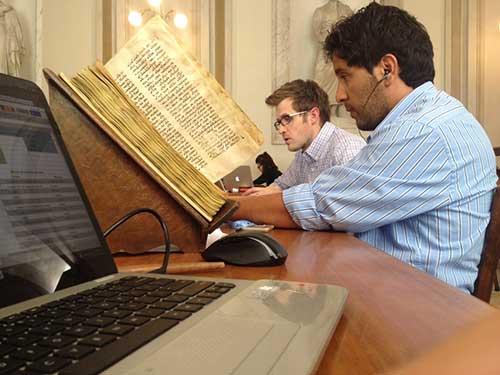
Daniel Becerra
I participated in a project with the Vatican Library and Brigham Young University that is working to preserve some of the oldest Syriac manuscripts in existence (some dating before 600 AD). We provided scientific data for over 80 manuscripts and prepared the digital versions for the Vatican Library’s online collection.
Pictured: Becerra (front) working on a Syriac manuscript with Luke Drake, a Ph.D. student from the University of North Carolina at Chapel Hill
Stephanie Gehring
I went to Paris in order to learn French, because one of the figures I am studying—the philosopher Simone Weil—was French-speaking, and much of the scholarship on her is in French, so I wanted not only to be able to read French well, but also to be able to speak it competently so that I could have conversations with the scholars who study her. I spent the first month in language school at the Institut Catholique, and the second month on my own in Paris, going to museums and cafes and having conversations with whoever would talk to me. It was exactly what I needed, and my French is enormously improved.
Julie Kelto Lillis
A summer research fellowship made it possible for me to carry out intensive research and translation work for my dissertation project. The project demonstrates the surprisingly varied ways that early Christians and their Mediterranean neighbors defined the idea of female virginity. This helps us better understand the history of Western thought on sexuality and also prompts us to examine our own definitions and assumptions about sexual status today.
One particularly interesting text, written by a Christian clergyman who previously worked as a medical physician, is not yet available in English, so I spent much of the summer reading, translating, and analyzing this Greek treatise and can now include this underutilized author as I juxtapose diverse perspectives on virginity from the fourth century. While my summer travels are usually restricted to conferences, fellowships are a crucial form of support for my ongoing and time-consuming encounters with the foreign world of ancient thought!
Lillis's summer research fellowship was supported by the Gurney Harriss Kearns Fellowship Fund.
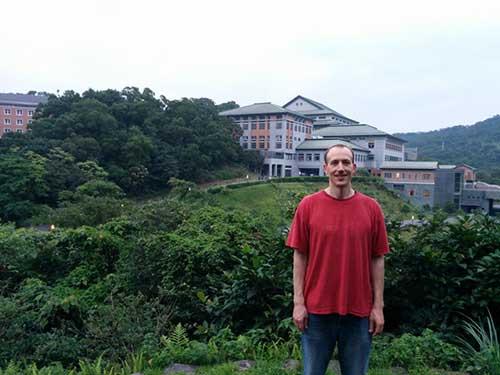
Jeffrey Nicolaisen
I spent five weeks conducting research at Dharma Drum Buddhist College, which is located at Dharma Drum Buddhist Mountain in New Taipei City, Taiwan. The mountain is the headquarters of the Dharma Drum Mountain international organization, which was founded by Master Sheng Yen, who created the concept of spiritual environmentalism and promoted it internationally.
At Dharma Drum Mountain, I was able to interview monks, nuns, and professors about Master Sheng Yen’s environmental thought and global outreach. I was also fortunate that my time in Taiwan coincided with the Fifth International Sheng Yen Education Foundation Conference, so I was able to meet Dharma Drum Zen masters from around the world.
In the second part of the summer, I spent eight weeks at the International Chinese Language Program at National Taiwan University in Taipei City. The program is one of two major international Chinese language programs specifically designed for graduate students. Each day, I had two hours of one-one-one instruction and two hours of small-group instruction. The program individualizes classes and content to each student, so I was able to study the Chinese most useful to my field of study.
My summer research at Dharma Drum Mountain and language training at the National Taiwan University were instrumental in helping me to develop a dissertation topic and prepare me to do research on East Asian Buddhism.
Pictured: Nicolaisen at Dharma Drum Buddhist Mountain
Kara Slade
In June, I participated in the inaugural conference of the Society of Scholar-Priests, which conveniently took place at Duke. I gave a panel presentation (“ ‘Gotta Serve Somebody’: Scripture, Tradition, and the Perils of Anglican Progressivism”), and I also preached at the opening service in Duke Chapel. Later in the summer, I wrote and submitted several other pieces for publication, including a book review for the Journal of the Society of Christian Ethics and a longer piece (“Singing Down to the Dust”) for Syndicate. In addition, I took the French for Reading course during the summer session and subsequently passed my translation exam.
Romance Studies
Domenico (Mimmo) Cangiano
In the summer of 2014, a Graduate School Summer Research Fellowship allowed me to consult the Primo Conti Foundation in Fiesole, Italy (near Florence). I consulted correspondence and unpublished manuscripts of some Italian writers of the early 20th century such as Giovanni Papini. Thanks to this fellowship, I could develop new ideas for my dissertation, “Wanderers in Contradiction. The Italian Road to Modernism (1903-1922).”
Fiammetta Di Lorenzo
The main focus of my research, within the context of the 19th century in French and Italian literatures, is the role of reading fiction in the construction of subjectivities and its interplay with historical-political turns. Thanks to the summer research fellowship, I had the opportunity to visit archives in three cities in Italy and therefore make significant progress in my research, particularly on the part of my project that concerns Italian women’s agency.
Di Lorenzo's summer research fellowship was supported by the Anne T. and Robert M. Bass Fellowship Fund.
Giuseppe Prigiotti
The Graduate School Summer Research Fellowship allowed me to consult historical journals and develop the write-up process of my dissertation project, tentatively titled “Translating Modernity: Secularism, Judaism, and Catholicism in 1870-1914 Italy.” I consulted several issues of the Italian Jewish journals Il Corriere israelitico and Il Vessillo israelitico at the National Library of Jerusalem and drafted one of the chapters of my dissertation, in which I compare Jewish and Catholic articles published at the beginning of 20th century to search for common references to modernization and germinal interfaith relations.
Prigiotti's summer research fellowship was supported by the Stuart Irwin Harris Fellowship Endowment Fund.
Sociology
Lauren Valentino
I conducted a literature review in the fields of morality and taste in preparation for a study I am conducting this year.
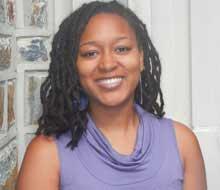
Trenita Childers
This summer, I moved to the Dominican Republic with my husband and two young children to start my dissertation research. I study social factors that affect the mental health of Haitian immigrants who live in the Dominican Republic. I am especially interested in perceived discrimination, ethnic identity, and documentation status.
The summer research fellowship allowed me to focus on reading and writing just before my trip. I was able to submit an article on mental health service use to a peer-reviewed journal for publication before I left the United States. The fellowship was also immensely helpful as I found an apartment, a car, and got settled in the Dominican Republic. Because of the funding, I was able to get settled quickly and jump into my research within two weeks. I look forward to the joys of research as I continue this journey.
Childers's summer research fellowship was supported by the Jess & Minnie Brady Jaffrey College Scholarship Fund.